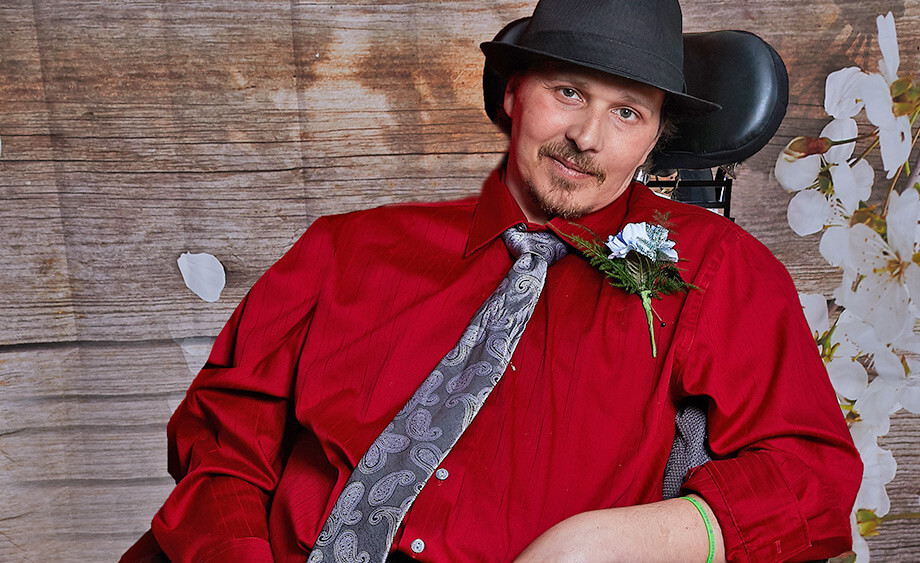
It is every parent’s worst nightmare – the phone call saying your child has been hospitalized and you should get there quickly.
For Karen Curzi, not only was this the case, but it marked the beginning of an unbelievable journey that took her from physicians telling her that her son would never wake up to seeing him talk, walk, eat and begin thinking about his future again.
It all started in September 2018 when Jarrett came home from work one day with a headache. He had suffered from migraines since he was a child, and usually a warm shower would help to alleviate the pain. But this headache was different. After getting out of the shower, Jarrett began holding his head, screaming in pain.
Karen, who was travelling at the time, was told by Jarrett’s fiancé Alya Barton that she should get back home as quickly as possible. When she arrived at the hospital, there were tubes everywhere, and her 36-year old son was grey and in a coma. Jarrett was diagnosed with a pseudo aneurysm, or brain bleed. The bleed was very severe and rare.
Over the next several weeks, Karen stayed by Jarrett’s side. He would suffer two strokes and undergo several surgeries to find and repair the bleed and to relieve the swelling. Karen was told by hospital personnel, on numerous occasions, that Jarret was not expected to survive, and she felt guilty because she lost hope at times. But despite the odds, Jarrett made it.
Unfortunately, what should have been a time of relief and celebration took a decidedly different turn. Even though his condition stabilized, Karen’s true fight for her son was just beginning.
When discussing the next step in Jarrett’s care, Karen requested that Jarrett be sent to Good Shepherd Rehabilitation; however, representatives at the hospital told Karen that Jarrett would not qualify. Instead, she was told to pick a nursing home for her son. As she persisted, she was told Good Shepherd would not accept his insurance and that she should be prepared to pay out of pocket.
Karen refused to put her son in a nursing home because she knew that Jarrett would not make the progress that he would at Good Shepherd. She wondered how she could live so close to a world-class rehabilitation provider and not be able to access their care.
Fortunately, Karen contacted the Admissions department at Good Shepherd who worked diligently on Karen’s behalf to secure the referral and arranged for Jarrett to be evaluated by Good Shepherd. Good Shepherd Admissions also helped Karen overcome roadblocks and hurdles and gave her emotional support through a very challenging time.
Upon completion of the evaluation, Jarrett was accepted for inpatient care at Good Shepherd Rehabilitation Hospital in Allentown and was placed in their Commission on Accreditation of Rehabilitation Facilities (CARF)-accredited brain injury program.
He arrived at Good Shepherd in a coma, unable to do anything on his own. Even in that state, Good Shepherd’s care team started him on three hours of intense physical, occupational and speech therapy every day.
It quickly became evident that, as usual, mom was right.
“From the day Jarrett arrived here, he has been making leaps and bounds of progress,” Karen says.
After a week at Good Shepherd, Jarrett opened his eyes and started tracking other people’s movement. By week three, he was sitting up in a chair and answering simple questions. One month after arriving at Good Shepherd, Jarrett could walk with the help of Good Shepherd’s Ekso Bionics Exoskeleton, write on a white board, eat, communicate and recognize people. Most important to Karen, he could smile again!
To the skeptics who told Karen her son would be paralyzed and not do well at Good Shepherd, Karen says, “Look at him now.”
“I remember driving by Good Shepherd as a child and seeing people outside in wheelchairs,” she says. “My parents always told me that people go to Good Shepherd to get better, and I have always remembered that.”
Her advice to other families who find themselves in similar situations is to not give up. Do not let others dictate where your loved one will go for recovery. “It’s your choice,” says Karen.
“Don’t ever give up,” she says. “Go toe to toe with anyone you have to. Do your research, and call Good Shepherd directly. Don’t just depend on what someone else is telling you.”
“Jarrett has come as far as he has because of Good Shepherd and no one else,” Karen says. “He is in the best place ever.”
For more information about Good Shepherd’s brain injury rehabilitation programs, call 1-888-44-REHAB (73422).
